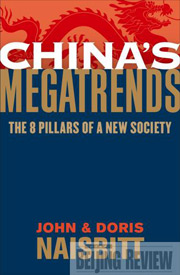|
 |
|
(COURTESY OF DORIS NAISBITT) |
We try to sort things out, figure them out, use our heads and try not to be prejudicial about anything. One of the guidelines for me is how powerful it is not to have to be right. We write things and people say maybe it is not right. We also said maybe it is not right but that is how it looks to us.
If you have to be right, like academics, they don't tiptoe past their data, because they don't want to be caught wrong. But that is really terribly inhibiting. It is liberating not to have to be right. You just have to see the world, look at it and talk about it. This is so interesting.
In your highly popular book, Megatrends: Ten New Directions Transforming Our Lives, which has many fans in China, you listed 10 new directions transforming people's lives. In retrospect, have the 10 directions accurately depicted the future?
John: The book is about the United States. I can only tell you that the Financial Times said not a single one was wrong.
Of course, the 10 megatrends played out because they were based on what was going on in the country. It was already happening and people hadn't noticed that it was happening. When I say it is happening, it sounds like I was predicting things and they all came true. Well, they had already begun.
That is what we are talking about in China. China has not yet reached the promise of the direction in which it is heading. It is not on the other side of the river. It is only about a third of the way there. It is only a guess, but it's an instructive estimate. This suggests it's just getting underway and it's going to be extraordinary.
You have been writing books on global trends for nearly three decades. Do you find it more difficult to predict because we are in a more complicated world?
John: Not really. The thing that is different today is that the media, especially television, is the great magnifier. No matter what happens, it is magnified all out of proportion, even including the fiscal crisis that is going on now or Michael Jackson's funeral. Anything that happens. It sounds like there is all this noise and it's a crazy world. It's partly the function of artificial magnification and also the function of bad news.
When I get up and look at CNN, I know exactly what I am going to see. An inventory from the most remote parts of the world, anywhere they can find the little bad news. If you let that run you, then it gets even more complicated than it used to be. I don't think it's more complicated than it used to be, except that there are more players because of globalization.
Do you have a favorite of the personal stories from Chinese people in the book?
Doris: One is of our friend Wang Yukun, the dean of a business school in Tsinghua University, who has an illiterate mother on a farm. She was so forward-looking that she told her son, "Only when you step out of the field can you see the dirt on your feet." We love that because that is teaching your children to look at facts and to look at what is really there, then they can move on. That's a symbol of what China did. China 30 years ago looked at itself and did not glorify the bad circumstances under some ideology, but said, "Our feet are stuck in the mud, so we have got to get out of this."
The mother sacrificed her own desires to enable her children to get a good education. The Chinese system has one very strong advantage—that if you are good at school, it supports you to move on. It is too exam-driven, but that's another thing.
We have another friend Wang Wei, who early on went to the United States and worked there. He came back because what China offers is more than what the West offers.
John: The recent invasion of "sea turtles" (Chinese returnees from foreign countries) is because the opportunities clearly are perceived to be greater in China than they are in the West these days; all over Asia, too, but especially in China.
Doris: The United States used to be the strongest magnet for intelligent people. Now that is more and more shifting to China.
In your short stay in Beijing this time, you are going to have a dialogue with former Minister of the State Council Information Office Zhao Qizheng. What are the main topics of the dialogue?
Doris: The topics are what is going on in China, how the West sees China and why the West's picture of China is different from the Chinese picture of China. There are two pictures of China. The question is what is the real picture of China.
John: I think neither is the real picture. One is too inside and one is too outside. That's what we are trying to do. We're trying to really see by doing it inside out but also trying to be as objective as we can about it. We think it doesn't serve anyone for the West not to really know what is happening in China.
Doris: The West has formed a picture about China and doesn't want to change it. The West always feeds the picture with what fits into the picture. We don't like that. Not everything is good about China, but very many things are very good.
John: The China bashing is fed by what I call the "fur factor"—fear, uncertainty and resentment about China. | 